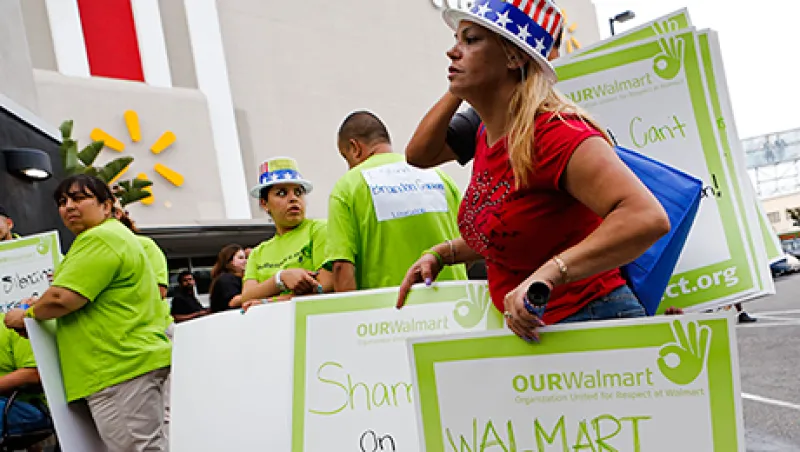By its own optimistic estimates, Wal-Mart Stores will need several more years to shake off sluggish growth and modernize its business model. But the company is moving a lot faster to improve its brand through very public initiatives on a number of high-profile issues.
In June, in the wake of the massacre of nine African-Americans at a Bible study session in a historic Charleston, South Carolina, church, Wal-Mart announced it would cease sales of Confederate flag–related items both in its stores and on its website. That quickly led other retailers — including Amazon.com, eBay and Sears Holdings Corp. — to follow suit.
In February, Wal-Mart waded into the growing national debate over income inequality by announcing raises for more than one third of its associates, as it calls employees. That was an unexpected move for a company that often is a magnet for bitter complaints from labor unions for opposing attempts to organize its employees and for its tight-fisted wage policies, which in the past have forced some part-time Wal-Mart workers to depend on food stamps.
But with almost 1.3 million people on its U.S. payroll, Wal-Mart is the largest private employer in the country. So other jumbo companies, such as Target Corp. and McDonald’s Corp., soon followed with wage hikes of their own.
More controversial has been Wal-Mart’s stand in favor of gay marriage. In late March the company posted a Twitter feed from CEO Doug McMillon asking Asa Hutchinson, governor of Arkansas, Wal-Mart’s home state, not to sign a so-called religious freedom bill that could have allowed discrimination against gays and lesbians. The governor did not sign the bill, and Wal-Mart’s position seemed to reverberate in other states considering similar legislation.
“It certainly gets noticed when the biggest retailer in the world takes on issues on which it was perceived to be on the other side of the table,” says Deutsche Bank analyst Paul Trussell. “We are seeing a very focused and purposeful strategy to have Wal-Mart become a leader on important social issues.”
Wal-Mart officials say they had no choice. “We don’t really want to be in politics,” says CFO Charles Holley Jr. “But there are some issues that require us to step up, especially when they affect our associates and customers.”
Clearly, there are bottom-line considerations as well. Many Wal-Mart customers are low-income consumers who would likely spend more at the company’s Supercenters if they benefited from a national uptick in wages. Gay and lesbian consumers have total buying power of more than $800 billion annually, according to Witeck Communications, a firm that tracks their wealth.
Though Wal-Mart’s social stands have received a windfall of publicity of late, the company has pushed lower-key initiatives in other areas, like environmental sustainability, for years. In 2007, Wal-Mart announced a plan to sell 100 million compact fluorescent lightbulbs, which it said would conserve the equivalent of energy needed to power 450,000 single-family homes over the lifetime of those squiggly bulbs.
“I was an accountant, and I remember thinking, ‘This is just PR,’” Holley recalls. He changed his mind when the 100 million bulbs were sold in only nine months instead of the targeted 12. “It was great for business, customers, the environment and for shareholders,” says the CFO.
Still ahead is a push for the adoption of higher animal welfare standards by Wal-Mart’s suppliers of meat, poultry and seafood products. In May the retailer called for the lower use of antibiotics and more living space for farm animals and fish. For now the guidelines are voluntary and have no set deadline. But when the largest grocer in the land speaks, farmers and fishermen listen.
See also “The Wal-Mart Empire Strikes Back.”






